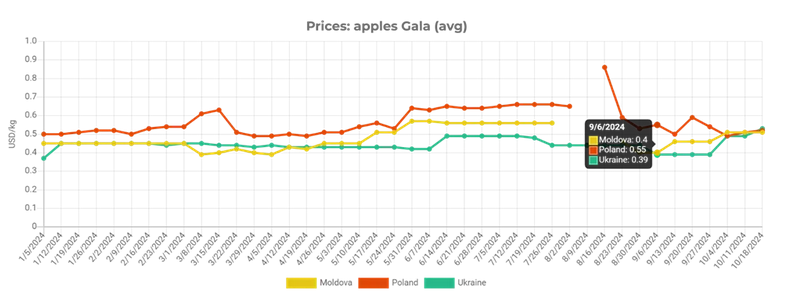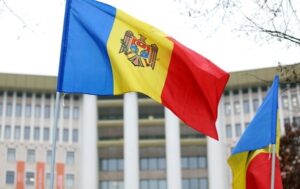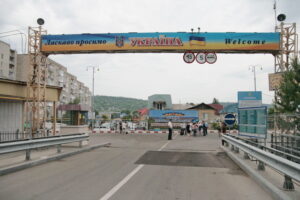
According to EastFruit analysts, wholesale prices for apples of “Gala” variety in Ukraine, Moldova and Poland are at record levels for this time for the last years. It is the most popular apple variety among exporters, as well as an increasingly popular apple variety among consumers, competing more and more successfully with the “Golden Delicious” variety.
While usually prices for Gala apple vary significantly in these three neighboring exporting countries, this season by mid-October prices in Moldova, Poland and Ukraine are almost identical, ranging from $0.51 to $0.53 per kg for a standard quality apple suitable for domestic fresh market sales.

As for the premium export quality apple, the prices are significantly higher. “The margin for the ‘premiumness’ of the apple is higher than usual in Eastern European countries this season. This is not only due to a general decrease in apple supply, but also to quality problems due to completely atypical weather conditions during the apple growing season,” says Andriy Yarmak, an economist in FAO’s investment department.
Read also: Prices for apples in Ukraine set new records
In less than a month, prices for “Gala” in Ukraine rose by 36%. In Moldova, the rise in apple prices began later, but over the past three weeks, prices have strengthened by 11% at once. In Poland, prices for the same variety increased by 6% in two weeks, although before that they tended to decrease from the incredibly high levels from which the season started and were much higher than in Ukraine and Poland.
According to traders, the main reason for the rise in apple prices is the reluctance of producers to rush their sales. Even in Ukraine, where Russian invaders attack civilian infrastructure, including the country’s energy facilities, on a daily basis, farmers are trying to keep their apples for longer, hoping for even higher price levels.
It should be noted that the increase in apple prices at this time of year is atypical for Eastern European countries, as apple supply is usually maximized and farmers are in a hurry to sell off the part of the produce that cannot be stored for a long period of time. Therefore, it cannot be excluded that in the winter-spring period, the prices for apple of popular varieties will unpleasantly surprise consumers.

The counting of votes in the Moldovan presidential election has been completed – incumbent President Maia Sandu and former Prosecutor General Alexandru Stoianoglo have reached the second round of the election.
According to the CEC press service, on Monday evening the counting of votes in the elections, which took place on Sunday, was completed. According to the results after counting 100% of the protocols, Sandu gained 42.45%, and Stoianoglo – 25.98% of the votes. Next are: chairman of Our Party Renato Usatii – 13.79%; former Bashkan of Gagauzia – 5.38%, former prosecutor Victoria Furtune – 4.45%; former prime ministers Vasile Tarlev and Ion Kiku – 3.19% and 2.06%. The other five candidates garnered less than one percent of the vote.
A total of 1,562,795 people took part in the election, which is 51.68% of the voters included in the voting lists.
Earlier, the Experts Club think tank presented an analytical material about the most important elections in the countries of the world in 2024, more video analysis is available here – https://youtu.be/73DB0GbJy4M?si=eGb95W02MgF6KzXU,
Subscribe to the Experts Club YouTube channel here – https://www.youtube.com/@ExpertsClub,
The second round of elections will be held in two weeks, on November 3.

Incumbent Moldovan President Maia Sandu is the favorite in the presidential race, while candidates Alexandru Stoianoglo and Renato Usatîi are fighting to reach the second round. These are the results of an opinion poll presented on Thursday, conducted by CBS-AXA and commissioned by the WatchDog.MD community. The presidential election in the country will be held next Sunday, October 20.
“Maia Sandu is the favorite in the race, with over 35% ready to vote for her. 9% are ready to vote for the candidate of the Socialist Party, Alexandru Stoianoglo, and 6.4% for the head of the Our Party, Renato Usatîi. The remaining eight candidates are gaining between 0.5 and 3% of the vote,” said Vasyl Kantarzhy, director of CBS-AXA, sociologist.
According to the poll, 85.7% of respondents said they would definitely go to the polls on October 20. Another 8.3% said they were likely to vote.
At the same time, 28.1% of respondents have not decided, 2.9% said they would not go to the polls, and 9.9% did not answer the question.
Vasyl Kantarzhy said that the polls of recent months show an “atypical trend”, namely that “as the election date approaches, the number of undecided voters is growing”.
He attributed this growth mainly to opposition candidates, in particular, Oleksandr Stoianoglo’s claims of Romanian citizenship, as well as the events surrounding the Shora group. “This forced supporters of a number of opposition candidates to reconsider their position and become undecided,” Kantarzy said.
There are 11 candidates registered to run in the presidential election, a record number of candidates for the entire period of national presidential elections in Moldova. In the period from 2000 to 2016, the president of Moldova was elected by the parliament.
The survey was conducted by telephone on October 11-16 with the participation of 1034 people. The margin of error is 3.05%.
Earlier, the Experts Club think tank presented an analytical material on the most important elections in the world in 2024, more detailed video analysis is available here – https://youtu.be/73DB0GbJy4M?si=eGb95W02MgF6KzXU
You can subscribe to the Experts Club YouTube channel here – https://www.youtube.com/@ExpertsClub

In the period from September 25 to September 27, at the checkpoint “Mohyliv-Podilskyi – Otacs”, there may be traffic restrictions due to the installation of weighing complexes, namely
– 25.09 – in the direction of “entry to Ukraine”;
– 26-27.09 – in the direction of “exit from Ukraine”.
During the repair works, the traffic of commercial vehicles may be limited to one lane.

An earthquake with a magnitude of 5.3 occurred in Romania at 17:40 Kyiv time, with tremors also felt in the city of Odesa. According to the website of the European-Mediterranean Seismological Center, the epicenter was located in the Vrancha Zone in the Carpathians at a depth of 137 km.
Odesa Mayor Hennadiy Trukhanov reported no casualties or damage in the city.
“An earthquake with a magnitude of 5.3 occurred in Romania. It was felt in Bulgaria, Moldova and Ukraine, including Odesa. There was no information about damage or injuries in the city,” Trukhanov wrote on Telegram.
In local social media, users reported that the tremors were also felt in Mykolaiv, Zaporizhzhia, Kharkiv, Khmelnytskyi, Cherkasy, and Bila Tserkva in Kyiv Oblast.

Moldovan authorities plan to complete a feasibility study by the end of 2024 on the construction of the country’s first multimodal logistics complex at the Beresti railway station in Ungheni (5 km from the border with Romania), the Moldovan Ministry of Economy said. The project is being implemented with technical support from USAID under the Institutional and Structural Reforms in Moldova program. Once the feasibility study is finalized, a tender to find an investor will be announced.
“The ambitious project includes rail and road access roads, container cranes, loading and unloading platforms, warehouses, and a fleet of trucks. It is estimated that the infrastructure will be able to handle up to 200,000 trucks annually, with cargo transshipment of about 4 million tons. Beresti terminal will become a regional logistics hub, integrating Moldova into the global transportation and logistics network,” the report says.
Currently, the main carriers from the East and West prefer to choose routes bypassing Moldova due to the lack of logistics infrastructure.
Beresti railway station is located 106 km from Chisinau, outside the city of Ungheni on the northern side, on the railway corridor that goes to the city of Balti and continues further to the border with Ukraine. The strategic location of the station is due to the proximity of the Romanian/EU border (5 km), as well as the connection to numerous industrial facilities and transportation routes.
The Beresti terminal site covers an area of 80 hectares, is owned by the state and managed by the State Enterprise “Railways of Moldova”. The site’s railroad tracks allow the use of both wide gauge (1520 mm) and European gauge (1435 mm).
According to Moldovan media, investments in the project are estimated at 30 million euros, the construction of the facility will take 24-30 months.